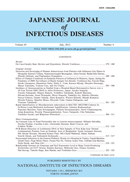Volume 74, Issue 6
Displaying 1-22 of 22 articles from this issue
- |<
- <
- 1
- >
- >|
Original Articles
-
2021 Volume 74 Issue 6 Pages 499-506
Published: November 22, 2021
Released on J-STAGE: November 22, 2021
Advance online publication: February 26, 2021Download PDF (675K) -
2021 Volume 74 Issue 6 Pages 507-510
Published: November 22, 2021
Released on J-STAGE: November 22, 2021
Advance online publication: March 31, 2021Download PDF (619K) -
2021 Volume 74 Issue 6 Pages 511-516
Published: November 22, 2021
Released on J-STAGE: November 22, 2021
Advance online publication: March 31, 2021Download PDF (623K) -
2021 Volume 74 Issue 6 Pages 517-521
Published: November 22, 2021
Released on J-STAGE: November 22, 2021
Advance online publication: March 31, 2021Download PDF (633K) -
2021 Volume 74 Issue 6 Pages 522-529
Published: November 22, 2021
Released on J-STAGE: November 22, 2021
Advance online publication: March 31, 2021Download PDF (964K) -
2021 Volume 74 Issue 6 Pages 530-536
Published: November 22, 2021
Released on J-STAGE: November 22, 2021
Advance online publication: March 31, 2021Download PDF (749K) -
2021 Volume 74 Issue 6 Pages 537-542
Published: November 22, 2021
Released on J-STAGE: November 22, 2021
Advance online publication: March 31, 2021Download PDF (691K) -
2021 Volume 74 Issue 6 Pages 543-548
Published: November 22, 2021
Released on J-STAGE: November 22, 2021
Advance online publication: April 30, 2021Download PDF (782K) -
2021 Volume 74 Issue 6 Pages 549-553
Published: November 22, 2021
Released on J-STAGE: November 22, 2021
Advance online publication: April 30, 2021Download PDF (748K) -
2021 Volume 74 Issue 6 Pages 554-559
Published: November 22, 2021
Released on J-STAGE: November 22, 2021
Advance online publication: April 30, 2021Download PDF (893K)
Short Communications
-
2021 Volume 74 Issue 6 Pages 560-562
Published: November 22, 2021
Released on J-STAGE: November 22, 2021
Advance online publication: February 26, 2021Download PDF (618K) -
2021 Volume 74 Issue 6 Pages 563-566
Published: November 22, 2021
Released on J-STAGE: November 22, 2021
Advance online publication: March 31, 2021Download PDF (1083K) -
2021 Volume 74 Issue 6 Pages 567-569
Published: November 22, 2021
Released on J-STAGE: November 22, 2021
Advance online publication: March 31, 2021Download PDF (1109K) -
2021 Volume 74 Issue 6 Pages 570-572
Published: November 22, 2021
Released on J-STAGE: November 22, 2021
Advance online publication: April 30, 2021Download PDF (599K) -
2021 Volume 74 Issue 6 Pages 573-575
Published: November 22, 2021
Released on J-STAGE: November 22, 2021
Advance online publication: April 30, 2021Download PDF (1089K) -
2021 Volume 74 Issue 6 Pages 576-578
Published: November 22, 2021
Released on J-STAGE: November 22, 2021
Advance online publication: April 30, 2021Download PDF (584K) -
2021 Volume 74 Issue 6 Pages 579-583
Published: November 22, 2021
Released on J-STAGE: November 22, 2021
Advance online publication: April 30, 2021Download PDF (636K) -
2021 Volume 74 Issue 6 Pages 584-586
Published: November 22, 2021
Released on J-STAGE: November 24, 2021
Advance online publication: April 30, 2021Download PDF (592K) -
2021 Volume 74 Issue 6 Pages 587-591
Published: November 22, 2021
Released on J-STAGE: November 22, 2021
Advance online publication: April 30, 2021Download PDF (1766K)
Method
-
2021 Volume 74 Issue 6 Pages 592-599
Published: November 22, 2021
Released on J-STAGE: November 22, 2021
Advance online publication: March 31, 2021Download PDF (963K)
Laboratory and Epidemiology Communications
-
2021 Volume 74 Issue 6 Pages 600-603
Published: November 22, 2021
Released on J-STAGE: November 22, 2021
Advance online publication: March 31, 2021Download PDF (827K) -
2021 Volume 74 Issue 6 Pages 604-606
Published: November 22, 2021
Released on J-STAGE: November 22, 2021
Advance online publication: March 31, 2021Download PDF (586K)
- |<
- <
- 1
- >
- >|
